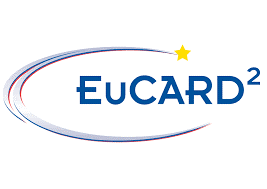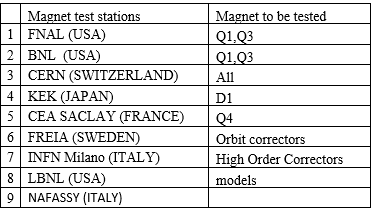

SMTS WORKSHOP
Superconducting Magnet Test Stands
Within the HL-LHC project about 100 superconducting magnets will be produced during the period 2018-2024. Magnets of different type and size based on NbTi or Nb3Sn technology. The design of the magnets is well advanced at CERN, LARP and other collaborating institutes (CEA, INFN, and CIEMAT) and for most of them it is planned to build a model and a prototype magnet during the period 2016-2018.
As for the design of the magnets, there are several institutes together with CERN participating to the testing of the models, prototypes and even the series magnets. Some institutes are equipped with adequate infrastructure while others are completing their installations during the next coming years.
The test of a superconducting magnets is part of the QA process to assess the soundness of the construction and the suitability for machine operation. In addition, during construction time, the test is also integral part of the construction chain: it must give feedback on time to include eventual corrective actions in the construction process and is a key milestone for triggering acceptance and passage of responsibility between firms and Institutes (in case of Industrial orders) or among Institutes (in the case of in-kind contribution). For the readiness of the test stands, for a good coherence between the facilities and planned test it is essential to coordinate the activities with the magnet production managed by WP3, WP6 and WP11 of HL LHC ( MSC group at CERN and collaborating Institutes).
The SMTS Workshop is going to contribute to the above mentioned coordination and assessment of the needs and readiness. Within the different sessions to treat a number of important questions linked to the magnet test.
- What the different test stations in the different institutes can test and what is planned to test (quadrupoles, dipoles, corrector magnets, models, prototypes, series magnets)
- Which infrastructure is planned to be used for the test (cryostats, liquefiers, powering and protecting circuits). Is such infrastructure ready, in commissioning or in construction phase? For when the infrastructure is planned to be ready? Is that compatible with the general planning. What equipment needs to be delivered by CERN (level of mutualisation and uniformization)?
- How the different test stands are performing measurements? What is the experience of the test stand? What is a typical test for the different institutes? Could we have unique protocol (with some flexibility) for HL-LHC test?
- Which are the different measuring equipment and methods and if we are convinced that the resulting measurements would not lead to discussions at later stage.
- Are there more optimised systems that the different stations would be happy to use, share?
- Which are the capacity of the different test stations (including for connectivity of instrumentations and if they are compatible with those we plan to use at the final test at CERN)
- How we can and which data to exchange between us. How are data analysed? Are we getting the same results from the same raw data?
- What would be a STANDARD qualification test and what should be done before magnets arrive to CERN. What to repeat and what not.
The main goal of the SMTS workshop is to verify that we will have all test stand ready in time and able to perform measurements following the HL-LHC standards and quality; to create an active network between the test stands allowing them to exchange methods, techniques, and experience on equipment, data and finally expertise when and where needed.
The LIST OF TEST STATIONS for HL-LHC magnets:
Most of the test stands for superconducting magnets are in collaboration with CERN for the HL-LHC project but we would like to welcome those working in this area as well independently if they will or not test magnets for HL-LHC. Therefore the above mentioned list has been extended as following
The workshop is a forum for potential users of the Trans National Accesses (TNA) supported by FP7 Eucard2 project[1] and Aries (under evaluation).
OCCURANCE of the SMTS Workshop
The SMTS Workshop would be held typically ONCE A YEAR and at the different test stations. It can be linked to events organised by HL LHC project or conferences where the participants are usually present.
PARTICIPANTS of the SMTS Workshop
The SMTS workshop participants will be composed by the test facility coordinators and their collaborators, the WP3, WP6A/B, WP7 and WP11 task leaders or delegated people by them, as well as representative of MSC group, other CERN group (CRG, MPE, EPC) involved as well as from LARP and other collaborating Institutes. It is estimated to about 40 PERSONS.
SMTW DURATION
Typically it will be planned over TWO WORKING Days.
The first event will cover the PRESENTATION of each test station and the general infrastructure and planning for the readiness. The goal of it will be to insure the project that each magnet at its stage of model or series will be tested in a correct way,; the test stand will be ready for the right date, the test stand is or will be equipped with the necessary equipment to perform the measurements. Discussions should be started in how and which data will be exchanged between the different institutes and CERN.
Further events will cover subjects linked to specified areas of measurements as magnetic or mechanical measurements but also protection and detection systems will be treated in details. Also the connection to the final IT string test will be covered, too. The safety and the interlock systems used by the different test stands will be presented with the goal to optimise the stands and improve where possible the safety of the personnel and the equipment.
Guidelines will be given to each presenter such that content of the talks and information presented later can be easily compared and most important actions taken based on such comparison.
The workshop convener with the help of a scientific secretary will summarise the main results from each workshop. This will be presented to the different test stand coordinators for actions if any and to HL-LHC TCC.
SMTS WORKSHOP Convener: Marta Bajko, CERN
SMTS WORKSHOP Scientific Secretary: Hugo Bajas, CERN
DATES and place for first occasion:
13th -14th of June “@ CERN in two days after QXF review @ CERN Geneva.
[1] "EuCARD-2 is co-funded by the partners and the European Commission under Capacities in the 7th Framework Programme, Grant Agreement 312453"



